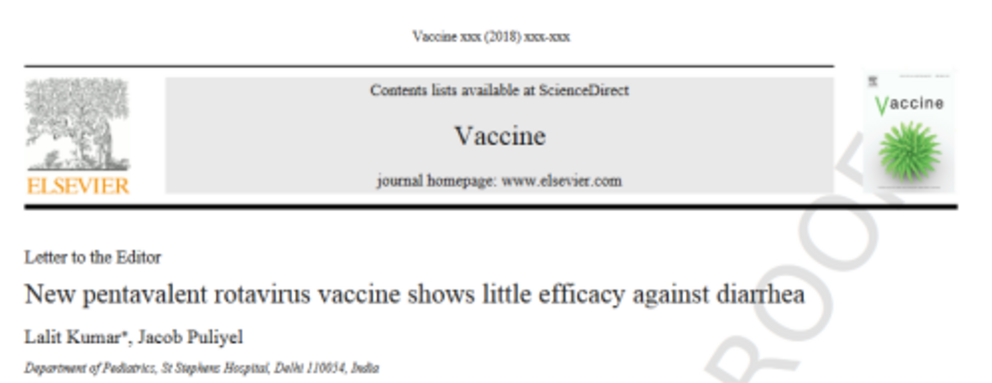New pentavalent rotavirus vaccine shows little efficacy
... against diarrhea
Letter to the Editor
New pentavalent rotavirus vaccine shows little efficacy against diarrhea
Lalit Kumar
[email protected]
Jacob Puliyel
Department of Pediatrics, St Stephens Hospital, Delhi 110054, India
⁎Corresponding author.
Keywords: Rotarix; Bovine human-reassortant pentavalent vaccine; Serum Institute of India
Rotavirus vaccine is recommended as a means of reducing diarrheal morbidity and deaths in developing countries [1]. The original efficacy studies with the presently licensed vaccines were done in the USA and Europe. Efficacy against severe rotavirus infection was around 90% (95% confidence interval (CI) : 85.·1‒–94.·1) and against all-cause severe gastroenteritis it was about 50% (CI: 39.·8‒–57.·8) [2]. Efficacy was less in Africa and Asia. In Africa it was 61% (CI: 44.0‒0–73.2) 2) against severe rotavirus diarrhoea and 30% (CI: 15.0‒–42.6) against all-cause severe diarrhoea [3].
The journal Vaccine has now published the results of a Phase-III randomized-control-trial, of a newly developed pentavalent rotavirus vaccine (BRV-PV). Vaccine efficacy against rotavirus diarrhoea ,(39.5% efficacy against severe rotavirus gastroenteritis (SRVGE) in the per protocol analysis) is emphasized in the report. However, the incidence of ‘all-cause severe gastroenteritis’ was not reduced by vaccination – vaccine efficacy was reported as 4.6% (95% CI: -−5.1‒ to 13.4) [4].
From the standpoint of the scientific record, additionally highlighting the clinically relevant aspect of their findings - namely efficacy against all-cause diarrheal morbidity, would enable decision makers to make choices about the vaccine, considering costs and benefits.
The same vaccine was studied in Niger. An efficacy of 66.7% against severe rotavirus gastroenteritis was reported in the per protocol population [5]. However severe gastroenteritis due to any etiology was not significantly lower among the vaccinated (difference in rate 1.97 cases per 100 person years confidence interval [CI](CI: –- 1.,28 to –5.22) [6]. The authors did post-hoc analysis of efficacy against ‘very severe diarrhoea’ (which they defined as Vesikari score of 15 or more) and reported a difference in rate of 3.08 per 100 person years (CI: 1.79 to –4.36) among the vaccinated. As efficacy against ‘very severe diarrhea’ has not been studied previously, comparable data for other rotavirus vaccines is not available.
References
[1] Rotavirus vaccines. WHO position paper -January 2013. Wkly Epidemiol Rec 2013;88(5):49–64.
[2] T. Vesikari, A. Karvonen, R. Prymula, V. Schuster, J.C. Tejedor, R. Cohen, et al., Efficacy of human rotavirus vaccine against rotavirus gastroenteritis during the first 2 years of life in European infants: randomised, double-blind T controlled study, Lancet 370, 2007, 1757–1763.
[3] S.A. Madhi, N.A. Cunliffe, D. Steele, D. Witte, M. Kirsten, C. Louw, et al., Effect of human rotavirus vaccine on severe diarrhea in African infants, N Engl J Med 362 (4), 2010 Jan 28, 289–298.
[4] P.S. Kulkarni, S. Desai, T. Tewari, A. Kawade, N. Goyal, B.S. Garg, et al., Flores J; SII BRV-PV author group. A randomized Phase III clinical trial to assess the efficacy of a bovine-human reassortantpentavalent rotavirus vaccine in Indian infants, Vaccine 35, 2017, 6228–6237.
[5] S. Isanaka, O. Guindo, C. Langendorf, A. Matar Seck, B.D. Plikaytis, N. Sayinzoga-Makombe, et al., Efficacy of a low-cost, heat-stable oral rotavirus vaccine in Niger, N Engl J Med 376, 2017, 1121–1130.
[6] J. Kaur and J. Puliyel, Heat-stable oral rotavirus vaccine, N Engl J M

